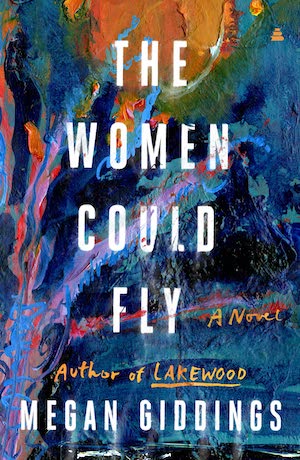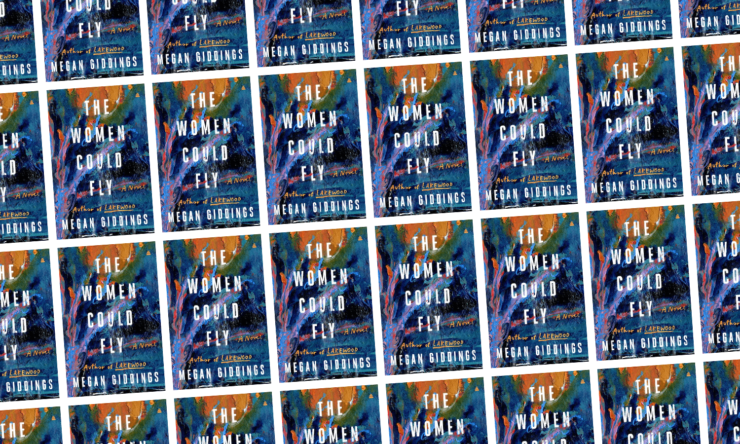It’s a specific kind of magic that some books, when you finish them, feel like stories you’ve always known—like reading the book unlocked it in your head. That’s the feeling I had when I slowly turned the last pages of Megan Giddings’ The Women Could Fly. Of course, my mind said. Of course that’s what would happen if magic were real and mostly available to women. Men would do everything they could to control it.
And it would look so much like the ways they try to control everything else.
The Women Could Fly is about Josephine Thomas, whose mother, Tiana, disappeared 14 years ago. When women do anything unpredictable, they are presumed to be witches. When your mother disappears under suspicion of witchcraft, well, people are likely to think you’re a witch, too.
But finally, Jo and her father have decided to accept that she’s dead. Or at least to agree to pretend they’ve accepted it. Jo, in a storage unit full of her mother’s things, is clearly still mourning. “There were faint whiffs of her when I opened different boxes. Cedar. Mint. Rosemary. I want to be precise because every time I’m precise about her, she returns for a half-second.”
Buy the Book


The Women Could Read
The line appears on the first page of the book, and was the first time my breath caught while reading it. If you’ve lost someone—if you seek out those moments where they return, if only for a fraction of a second—you probably know that feeling. It’s one of many times Giddings puts her finger directly on the sorest spots of loss, of missing and mourning, of a certain way of moving through the world. Her second novel is full of sharp, precise turns of phrase that I couldn’t stop writing down, whether about Jo’s anger or about the smallest ordinary detail. “All the wine bottles were clearly not from a grocery store, no horses or roosters or men’s names in sight,” Jo thinks at a party, and I knew exactly what kind of party it was.
Accepting Tiana’s death is not the closure that Jo or her father might have wanted. Tiana’s will stipulates that Jo will inherit a decent sum of money if she travels, on a specific date, to an island in Lake Superior. (“She had loved the lakes. … Superior was for mystery.”) The next possible date is four days away. It’s now, or wait another seven years. So off Jo goes, in the company of her best friend Angie. What she finds there changes everything.
The Women Could Fly is about magic and witches and power and patriarchy, about grief and loss and fury—but it’s equally about mothers and daughters, women and friends, lovers and community. I am being cagey about the plot because when it gets going—when Jo and a creepy doll make their way to that island—it surprised me in ways I was glad not to have expected. This isn’t a twisty plot kind of book, but an emotionally resonant kind of book; the feelings Giddings embeds in her text will sing differently for every reader. This is a story about getting what you want and finding it’s not all what you wanted, but also finding all the things you didn’t even know you wanted in the process.
Like Lakewood, Giddings’ debut, Women is an intimate, character-focused story that fills in the much bigger world around it with precisely measured detail and worldbuilding. Giddings is subtle, wise, considered; the ways in which her world controls women are specific and believable, practical and cruel systems that are an inevitable part of the characters’ lives. This isn’t an overwrought dystopia built on a false gender binary, but a nuanced world driven by the vicious bureaucracy of fearful, power-grabbing men. “Anything can make sense to a person as long as it helps them feel powerful,” Jo thinks when two of those men go on at great length about witchcraft in ways that are utter nonsense.
When women turn 28, they have to register with the state and get witch-tested regularly. The only real safety lies in hetero marriage. Women—and everyone else who exists outside this framework—aren’t free. And queer Black women like Jo are even less free, even more curtailed. Every way in which a person doesn’t conform is another way for the state to come for her.
Which is to say: this world looks very familiar. But with witches.
What exactly a witch is is never defined. (Can it be defined?) A woman, usually—but not exclusively—who can do magic. Maybe she pointed at someone and they got a rash. Maybe she makes magic art. (Jo’s job at the Museum of Cursed Art of Southern Michigan is brilliantly imagined, right down to the works of witch art.) Maybe a witch is just a person who exists, has desires, does something that didn’t fit into the heteronormative capitalist patriarchy. And maybe she does magic.
The Women Could Fly is full of elegant foreshadowing, and of stories that are always more than they appear. Giddings knows just how a listener and a teller each imbue a story with their own knowledge, their own experiences and expectations. Tiana tells Jo all kinds of stories, some about magic, and at least one about how magic isn’t real (“My mother believed witches were a hoax still perpetuated today to keep women afraid and oppressed”). Jo, in her narration, is telling the reader stories, and she too knows that we all bring our own baggage to the telling.
There are so many layers to Giddings’ work that I haven’t even gotten to Jo’s complex relationship with Party City, aka Preston, a lovely fellow who is nevertheless still a man, and therefore a person with whom Jo can never be equal. Or to the questions The Women Could Fly asks about freedom and community, safety and companionship, magic and creativity and power. Or to the precise grace of Giddings’ writing, which gives us Jo’s character in her storytelling, her way of paying attention to the world, her deep wells of love, and her occasionally biting comebacks that had me giggling in delight.
Within fifteen minutes of finishing The Women Could Fly, I walked out my front door and straight to the nearest bookstore where I could find a copy of Lakewood, Giddings’ debut. I would have bought a dozen more of her books if they existed. I will follow her anywhere. This book is its own kind of transportingly magical island, and one that any reader can visit.
The Women Could Fly is published by Amistad.
Molly Templeton lives and writes in Oregon, and spends as much time as possible in the woods. Sometimes she talks about books on Twitter.











Sounds to me like someone should write an essay on this book and Kelly Barnhill’s When Women Were Dragons. A spoilery essay, for people who have already read the books. There could be interesting things to say about common concerns and ideas, as well as about the overlap and differences between the stories the two authors created to address them.